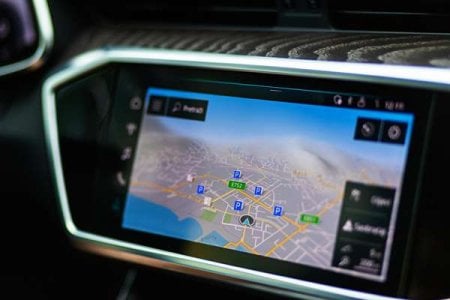The Secret Risks of Modern 'Connected Cars' that Manufacturers Don't Want You to Discover!
By
Danielle F.
- Replies 1
In the golden age of motoring, the car was a symbol of freedom, a private sanctuary on wheels where the driver was king of their domain. The open road beckoned, and the only thing between you and the horizon was your trusty vehicle and a full tank of petrol. But as we cruise into the future, the very essence of what made cars a bastion of personal liberty is shifting gears. Today's vehicles, brimming with digital technology, are transforming into something more akin to rolling smartphones – connected, monitored, and, as some experts warn, potentially manipulative.
The 'connected car' is no longer a concept; it's the standard. With each new model year, vehicles are increasingly equipped with internet-enabled features that promise safety, convenience, and entertainment. These modern marvels can automatically call emergency services after an accident, remind you to check the backseat on a hot day, and even allow you to start the air conditioning before you get in. They can guide you back to your parked car, monitor tire pressure, and provide a wealth of diagnostic data. But beneath this shiny veneer of technological advancement lies a web of privacy concerns that many manufacturers would rather keep under wraps.
A chilling report from the University of New South Wales Law and Justice department, titled Driving Blind: The Unexamined Privacy Risks of Connected Cars, reveals a stark reality: the data collected by our vehicles could be painting a highly detailed and personal picture of our lives. Associate Professor Katherine Kemp, a leading voice in the study, warns that the misuse of this data could lead to significant privacy and security threats. The concern is not just hypothetical; it's rooted in the very design of these connected systems.
The convenience of syncing your car with a mobile app comes at a potential cost. While it's undoubtedly handy to check your car's fuel level or unlock the doors with a tap on your screen, this level of connectivity opens the door to data sharing with third parties, including insurance companies, roadside service providers, and even personal acquaintances. The implications are vast, ranging from targeted advertising to more sinister scenarios like stalking or theft.
The UNSW report scrutinises the privacy policies of 15 car brands available in Australia, uncovering a labyrinth of legalese and loopholes. Consumers face a daunting task in understanding the privacy terms, often buried in lengthy documents or obscured by unhelpful interfaces. Some brands make dubious claims that certain data isn't 'personal information,' suggesting it falls outside the scope of privacy laws. Others admit to re-purposing personal information for marketing or research, sharing it with third parties without explicit consent.
The data collected isn't as anonymous as some manufacturers claim. When combined, the various pieces of information – from GPS tracks to mobile phone connections – can reveal the driver's identity. Companies like Mazda and Ford acknowledge collecting and matching data with giants like Meta and Google, turning your driving habits into valuable commodities for marketers and insurers.
The risks extend beyond mere privacy invasions. General Motors has faced accusations of selling identifiable vehicle tracking data, leading to unexpected insurance premium hikes. Chinese manufacturer BYD, operating under the watchful eye of the Chinese Communist Party, admits to collecting a wide array of data for purposes that include marketing and surveillance.
As we look to the future, with predictions that 93 percent of new car sales by 2031 will be connected vehicles, the question of privacy in our cars becomes increasingly pressing. The freedom once symbolised by the automobile is being redefined, and not necessarily in the driver's favour.
So, what can you do as a consumer? Stay informed, read the fine print, and understand the capabilities and privacy policies of your connected car. Demand transparency from manufacturers and hold them accountable for the data they collect. The road ahead is one where vigilance is as essential as a seat belt.

We at the Seniors Discount Club invite you to share your thoughts and experiences with connected cars. Have you encountered any privacy concerns with your vehicle? How do you feel about the trade-off between convenience and privacy? Let's navigate this conversation together in the comments below.
The 'connected car' is no longer a concept; it's the standard. With each new model year, vehicles are increasingly equipped with internet-enabled features that promise safety, convenience, and entertainment. These modern marvels can automatically call emergency services after an accident, remind you to check the backseat on a hot day, and even allow you to start the air conditioning before you get in. They can guide you back to your parked car, monitor tire pressure, and provide a wealth of diagnostic data. But beneath this shiny veneer of technological advancement lies a web of privacy concerns that many manufacturers would rather keep under wraps.
A chilling report from the University of New South Wales Law and Justice department, titled Driving Blind: The Unexamined Privacy Risks of Connected Cars, reveals a stark reality: the data collected by our vehicles could be painting a highly detailed and personal picture of our lives. Associate Professor Katherine Kemp, a leading voice in the study, warns that the misuse of this data could lead to significant privacy and security threats. The concern is not just hypothetical; it's rooted in the very design of these connected systems.
The convenience of syncing your car with a mobile app comes at a potential cost. While it's undoubtedly handy to check your car's fuel level or unlock the doors with a tap on your screen, this level of connectivity opens the door to data sharing with third parties, including insurance companies, roadside service providers, and even personal acquaintances. The implications are vast, ranging from targeted advertising to more sinister scenarios like stalking or theft.
The UNSW report scrutinises the privacy policies of 15 car brands available in Australia, uncovering a labyrinth of legalese and loopholes. Consumers face a daunting task in understanding the privacy terms, often buried in lengthy documents or obscured by unhelpful interfaces. Some brands make dubious claims that certain data isn't 'personal information,' suggesting it falls outside the scope of privacy laws. Others admit to re-purposing personal information for marketing or research, sharing it with third parties without explicit consent.
The data collected isn't as anonymous as some manufacturers claim. When combined, the various pieces of information – from GPS tracks to mobile phone connections – can reveal the driver's identity. Companies like Mazda and Ford acknowledge collecting and matching data with giants like Meta and Google, turning your driving habits into valuable commodities for marketers and insurers.
The risks extend beyond mere privacy invasions. General Motors has faced accusations of selling identifiable vehicle tracking data, leading to unexpected insurance premium hikes. Chinese manufacturer BYD, operating under the watchful eye of the Chinese Communist Party, admits to collecting a wide array of data for purposes that include marketing and surveillance.
As we look to the future, with predictions that 93 percent of new car sales by 2031 will be connected vehicles, the question of privacy in our cars becomes increasingly pressing. The freedom once symbolised by the automobile is being redefined, and not necessarily in the driver's favour.
So, what can you do as a consumer? Stay informed, read the fine print, and understand the capabilities and privacy policies of your connected car. Demand transparency from manufacturers and hold them accountable for the data they collect. The road ahead is one where vigilance is as essential as a seat belt.
Key Takeaways
- A new study from the University of New South Wales Law and Justice department highlights the risks associated with the data collected by modern 'connected cars'.
- The study warns of the potential for misuse of data that can lead to privacy and security threats, and even facilitate crimes such as domestic violence and stalking.
- Car manufacturers collect a wide array of personal information through connected cars, and there are concerns about how this data is used and shared with third parties, including for marketing and research purposes.
- Privacy terms associated with connected cars are often complex and challenging for consumers to understand, with important details buried in lengthy disclosure documents.








